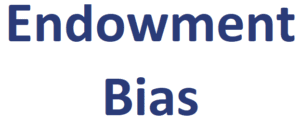Endowment bias
Endowment bias occurs when an asset is felt to be special and more valuable simply because it is already owned. For example, when one spouse holds onto the securities of their deceased spouse purchased for some reason like sentiment that is unrelated to the current merits of the securities.
On this page, we discuss the origin of the endowment bias as well as the consequences and implications for investors’ portfolios.
Endowment bias definition
The endowment bias in behavioral finance was first described by Thaler in 1980 in a paper titled ‘Toward a positive theory of consumer choice’ which was published in the Journal of Economic Behavior & Organization.
In this and related studies, individuals were asked to state their minimum sale price for an asset they owned (say 25$) and their maximum purchase price (23$). The fact that these individuals wanted only to sell it at a higher price than they would pay for it has been explained as endowment. Once they own it, they act as if it is worth more than they would pay.
Consequences and implications endowment effect
Consequences and implications of the endowment effect may include:
- failing to sell an inappropriate asset resulting in inappropriate asset allocation
- holding things you are familiar with because they provided some intangible sense of comfort
The endowment effect is common with inherited assets and might be detected or mitigated by asking a question such as “Would you make this same investment with new money today?” If inherited assets are significant holdings in the portfolio it may be essential to address the bias. Starting a disciplined diversification program could be a way to ease the discomfort of sales.
If endowment bias means that financial goals are unlikely to be met, then the emotional attachment to investments must be moderated. Small steps may be used to move toward acceptable asset allocation over time.
Summary
We discussed the endowment effect, the tendency of people to value more if it is already owned.

